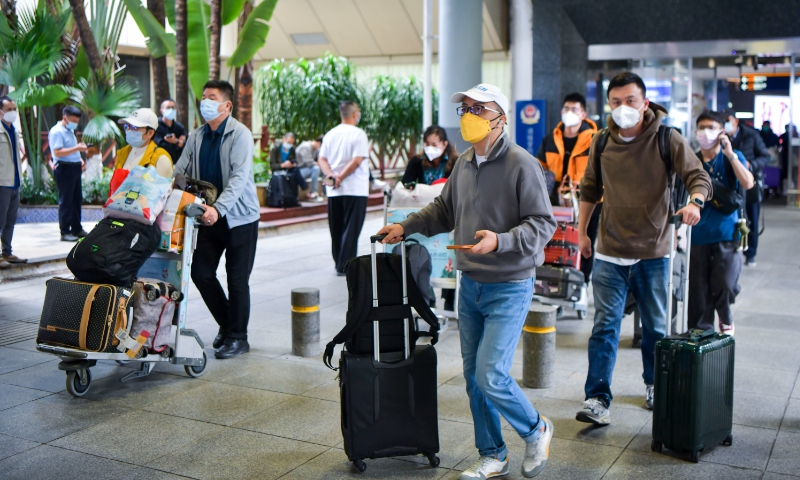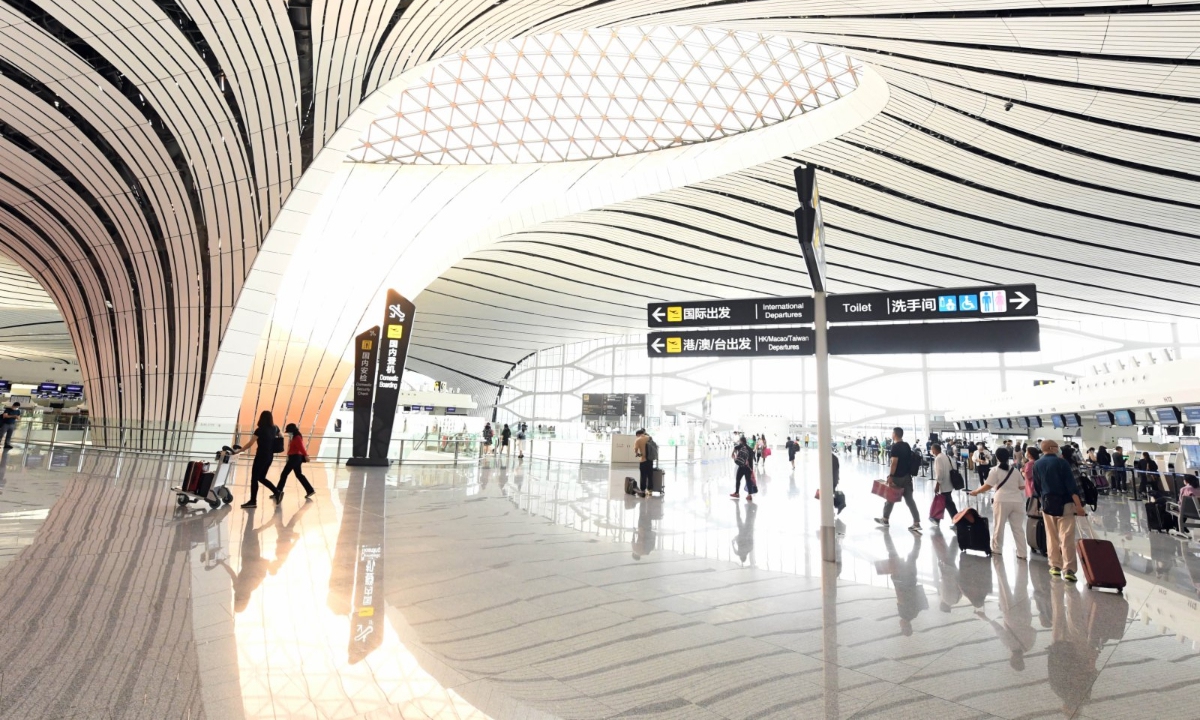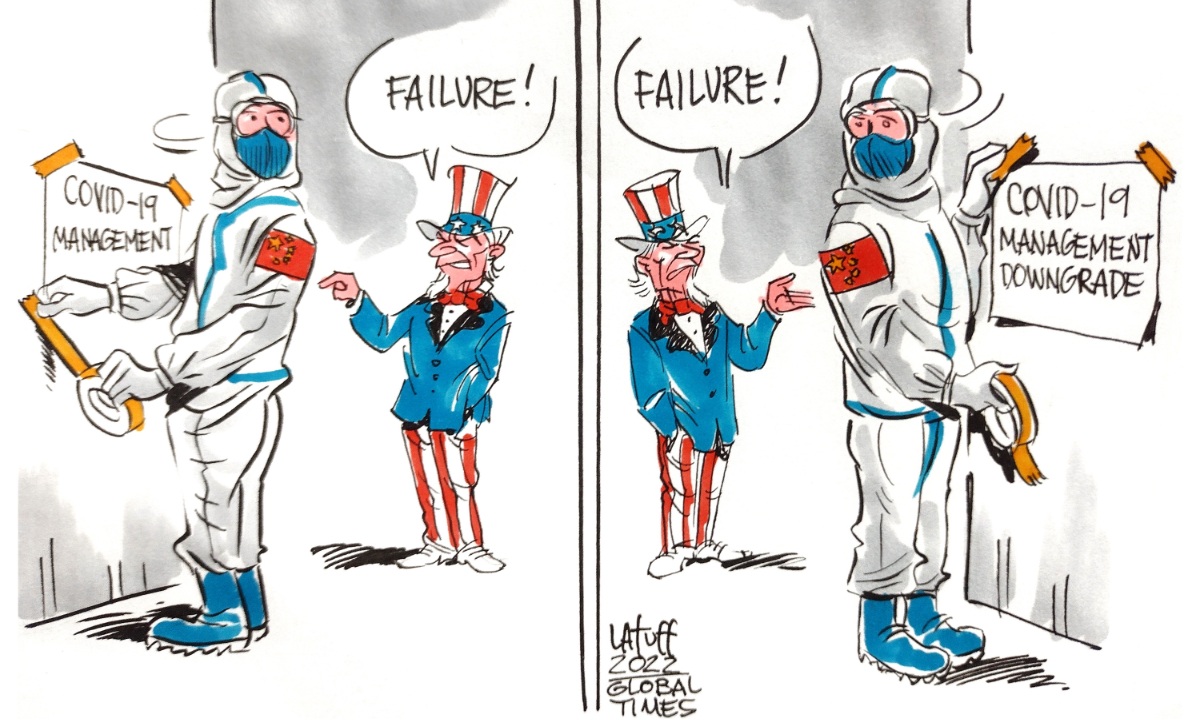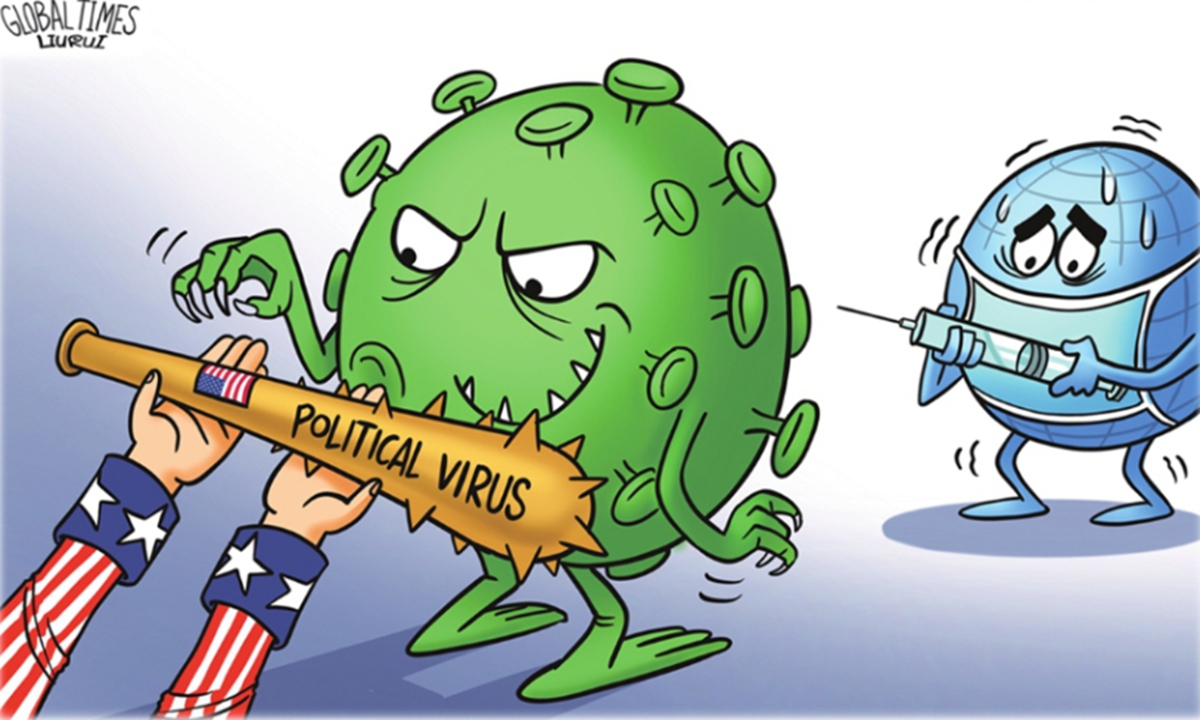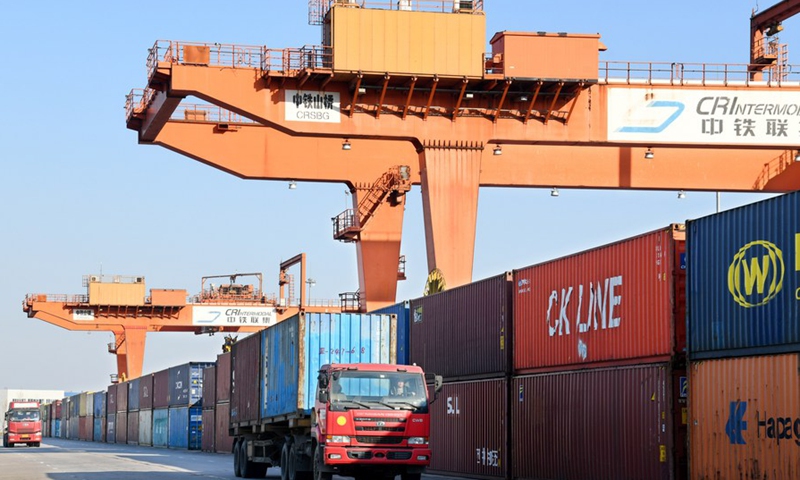Beijing Daxing International Airport Photo: Xinhua
While EU countries are scheduled to meet on Wednesday on a coordinated response to the epidemic situation in China, about a dozen countries have imposed fresh travel regulations on travelers from China, which are considered as "temporary, unnecessary and lacking scientific basis," some Chinese official and experts said. They also believed that the new regulations are "just a waste of time and resources," and some excessive measures are unacceptable, which are political manipulation and discriminatory. In response to those moves, Chinese Foreign Ministry said on Tuesday that the country will take corresponding measures in response to varying situations based on the principle of reciprocity. Health officials from EU countries will hold talks on Wednesday after a similar meeting was held urging the EU countries to test passengers arriving from China on December 29 as China is poised to ease travel restrictions on January 8. A spokeswoman for the Swedish presidency of the EU was quoted as saying in a Reuters report that "there's a scheduled Integrated Political Crisis Response meeting on Wednesday, January 4, for an update of the COVID-19 situation in China and to discuss possible EU measures to be taken in a coordinated way." Only France, Italy and Spain require tests in the 27-nation bloc, and France also urged the EU on Sunday to follow suit as the country obliges passengers on flights from China to present proof upon boarding of having tested negative for COVID-19 less than 48 hours before takeoff. Belgium will test wastewater from planes arriving from China for new COVID variants as part of new steps against the spread of the coronavirus as infections in China surge, Reuters reported, citing the government announcement on Monday. Some countries outside the EU also imposed similar restrictions, for example, the US Centers for Disease Control and Prevention said recently that from January 5, travelers boarding flights to the US from the Chinese mainland, Hong Kong and Macao would need a negative COVID-19 test or proof they had recovered from a previous infection. The requirements also apply to passengers arriving in the US via a third country and to those connecting to other destinations through the US. However, some countries may see a change in their policies. Passengers from China who arrive in the UK next week will not face compulsory COVID-19 tests on arrival, British media outlet The Independent reported on Monday, after the government is reportedly bringing back travel restrictions for passengers from the Chinese mainland starting from January 5. Mao Ning, spokesperson of the Chinese Foreign Ministry, said at a routine press conference on Tuesday that since China released the provisional measures, many countries have responded warmly to them. We appreciate this and will continue to adapt and adjust our COVID response measures in light of the latest COVID situation, better facilitate the safe and orderly cross-border travel of Chinese and foreign nationals and international exchange and cooperation. Regarding the restrictions targeting travelers arriving from China, my colleague responded to relevant questions last week. I'd like to reiterate China's position. We stand ready to step up communication with the rest of the international community and work together to prevail over COVID, Mao said. "Meanwhile, we do not believe the entry restriction measures some countries have taken against China are science-based. Some of these measures are disproportionate and simply unacceptable. We firmly reject using COVID measures for political purposes and will take corresponding measures in response to varying situations based on the principle of reciprocity," Mao said. Some major reasons cited by Western media in explaining the new restrictions imposed by some countries on travelers from China include growing worries over a lack of information from China on variants and concerns about resurgence of infections. However, some health professionals doubt that whether the rules are necessary and feasible. "I think that requiring a PCR test for every traveler is unnecessary. As the world is now mainly preventing more virulent and more transmissible variants, it's more important to conduct on-site sampling to track variants through genomic sequencing," Chen Xi, an assistant professor of public health at Yale University, told the Global Times on Tuesday. Many countries are now fully largely vaccinated in order to prevent a large outbreak of mutated variants while still worrying about new subtypes of Omicron, which probably makes the genomic sequencing more effective than PCR tests, Chen said. "I believe those countries' travel ban is only temporary, as China just relaxed its COVID-19 response and cases began to increase. Yet I believe their measures of detecting samples from arrivals from China, as well as requiring test results from those passengers, are just a waste of time and resources," an expert close to Chinese CDC told the Global Times on Tuesday on the condition of anonymity. The COVID-19 cases are ballooning all around the world and it is possible that new variants could be appearing in any country, he said. "The most important thing is that disease control departments all around the globe keep monitoring new variants and keep the public informed," the expert noted. "Maybe politicians like to hype such a threat, and show their people that the government is doing something to protect its people from danger, but from a virology perspective, I think those restrictive measures are unnecessary," he said. Health experts from many countries have said that the main variant now spreading in China has previously been found elsewhere already, and that a new variant can emerge anywhere on the planet, which means entry restrictions targeting China are unnecessary, Mao said.
"China always believes that for all countries, COVID response measures need to be science-based and proportionate. They should not be used for political manipulation, there should not be discriminatory measures against certain countries, and measures should not affect normal travel and people-to-people exchange and cooperation," Mao stressed.
NASA chief’s hawkish remarks another pathetic attempt, exposes US own hegemony: experts
Related posts
Illustration: Liu Rui/GT People’s fear toward Omicron eases quickly Making a reasonable argument is not a term in Washington'.
West’s attempts to deny China’s three-year effort against COVID by criticizing a short period of imperfection will end up in vain; by criticizing China’s COVID policies, West is getting its retaliation in first

